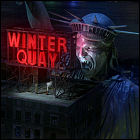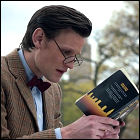 A visit to modern-day New York City takes an unexpected twist. While Rory goes for lunch, the Doctor and Amy realize that the mystery novel that the Doctor is reading was, in fact, written by River Song, and describes Rory’s sudden abduction through time into the 1920s. The Doctor and Amy follow, discovering that River has become embroiled in shady dealings with a sinister collector of statues who happen to be Weeping Angels. Even the Statue of Liberty stalks the streets of New York at night. After escaping their immediate predicament, they find Rory – in his 80s, dying in a hotel room – even though they’ve rescued the younger Rory. It seems that he is fated to die, the temporal energy from his time travels feeding the Angels of New York. Amy and Rory take drastic steps – and, the Doctor warns, very ill-advised ones – to end the Angels’ reign by creating a dangerous paradox in their personal history. But this time, even the Time Lord can’t help his friends escape their inevitable fate.
A visit to modern-day New York City takes an unexpected twist. While Rory goes for lunch, the Doctor and Amy realize that the mystery novel that the Doctor is reading was, in fact, written by River Song, and describes Rory’s sudden abduction through time into the 1920s. The Doctor and Amy follow, discovering that River has become embroiled in shady dealings with a sinister collector of statues who happen to be Weeping Angels. Even the Statue of Liberty stalks the streets of New York at night. After escaping their immediate predicament, they find Rory – in his 80s, dying in a hotel room – even though they’ve rescued the younger Rory. It seems that he is fated to die, the temporal energy from his time travels feeding the Angels of New York. Amy and Rory take drastic steps – and, the Doctor warns, very ill-advised ones – to end the Angels’ reign by creating a dangerous paradox in their personal history. But this time, even the Time Lord can’t help his friends escape their inevitable fate.
written by Steven Moffat
directed by Nick Hurran
music by Murray GoldCast: Matt Smith (The Doctor), Karen Gillan (Amy Pond), Arthur Darvill (Rory Williams), Alex Kingston (River Song), Mike McShane (Grayle), Rob David (Sam Garner), Bently Kalu (Hood),
Ozzie Yue (Foreman), Burnell Tucker (Old Garner), Zac Fox (Photoshoot PA)
Notes: This episode, featuring the long-anticipated, heavily-hyped exit of Rory and Amy, is the end of “Series 7A” (a term coined by the production team; following the Christmas episode, the remainder of the season aired in 2013). Location filming was done in New York, the second time a Doctor Who film crew, complete with the show’s stars, has filmed on location in the United States.
LogBook entry & review by Earl Green
Review: One of the unspoken rules of writing even halfway decent fiction is consistency. A character must be consistent, even if actions consistent to the core of the character may initially seem random to the audience. Building a universe that modifies or rewrites the physical laws of the world as we know it – say, to allow for things like superpowers or magic – must include consistency. And with this, their fourth appearance as the main enemy in a Doctor Who story, the Weeping Angels became even less consistent than the Daleks managed to become in over four decades. Nearly every rule set down in Blink, which established the Angels, has been ignored to suit the writer’s whim. And “writer,” in this case, is singular: Steven Moffat has scripted all of the Weeping Angel stories. If anyone could keep these rules straight, whether it’s “don’t blink” or “don’t get them wet or feed them after midnight,” you’d think the creatures’ creator would have it under control. Instead, he throws the most basic rule by which the Angels have functioned – that they freeze if you take your eyes off of them – out the window in favor of an irresistible  sight gag (the Statue of Liberty, now sporting a gaping maw full of fangs, apparently moving unnoticed and unwitnessed through one of the most populous cities in the world, where surely, someone would’ve seen it and frozen it in its tracks, never mind someone raising an alarm about an empty pedestal on Ellis Island). Yes, it’s a gasp-and-giggle-inducing sight gag to make the Statue of Liberty a giant Weeping Angel. No, it makes absolutely no sense given what we’ve learned about the Angels so far. I’d be less surprised (but still a bit annoyed) if the various misfires on the Angels’ ground rules had come from a number of writers, but they’ve all some from the same writer.
sight gag (the Statue of Liberty, now sporting a gaping maw full of fangs, apparently moving unnoticed and unwitnessed through one of the most populous cities in the world, where surely, someone would’ve seen it and frozen it in its tracks, never mind someone raising an alarm about an empty pedestal on Ellis Island). Yes, it’s a gasp-and-giggle-inducing sight gag to make the Statue of Liberty a giant Weeping Angel. No, it makes absolutely no sense given what we’ve learned about the Angels so far. I’d be less surprised (but still a bit annoyed) if the various misfires on the Angels’ ground rules had come from a number of writers, but they’ve all some from the same writer.
Fortunately, Amy and Rory are far more critical to the successes that The Angels Take Manhattan can claim. The focus on these two characters is less obvious than, say, Earthshock‘s sudden focus on Adric, given that the entire seventh season up to this point has been hinting at their exit. But again, there’s a little bit of inconsistency: Rory comes up with the idea for fouling the Angels’ plan with a time paradox, an opportunity that surely the Doctor should’ve seen from miles away, even as dangerous as it is. Never mind the Angels – for the Doctor, of all people, to give up on rewriting history is an inconsistency with the fabric of the whole series. The notion that time and space around New York City are somehow impassible now is trashed even before the end of the episode – obviously the Doctor goes back to retrieve the last page of the book, which exists because River went  back there too. Or did the Doctor land the TARDIS in Buffalo and take the bus, just happening to luck out because a piece of loose paper didn’t blow away or otherwise get lost in the middle of NYC?
back there too. Or did the Doctor land the TARDIS in Buffalo and take the bus, just happening to luck out because a piece of loose paper didn’t blow away or otherwise get lost in the middle of NYC?
The Ponds’ exit hits all the requisite emotional beats – the best part of the whole episode may be the notion that marriage is making/changing the course of history as much as anything the Doctor does – but aside from the emotionally satisfying ending, little about the story holds up to even cursory scrutiny. There’s no reason why one should have to be sacrificed in order to have the other.

